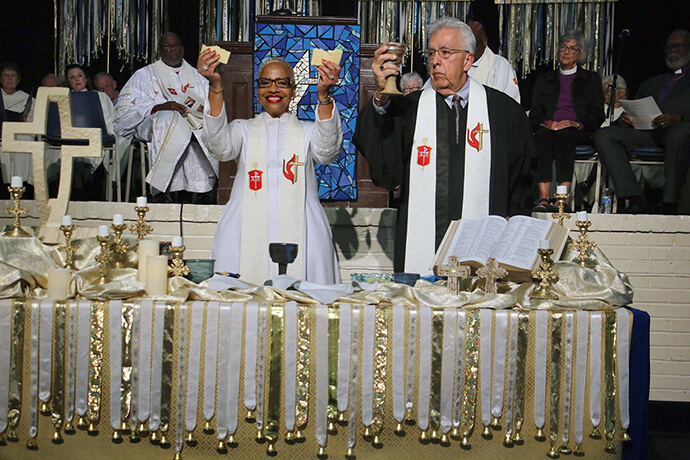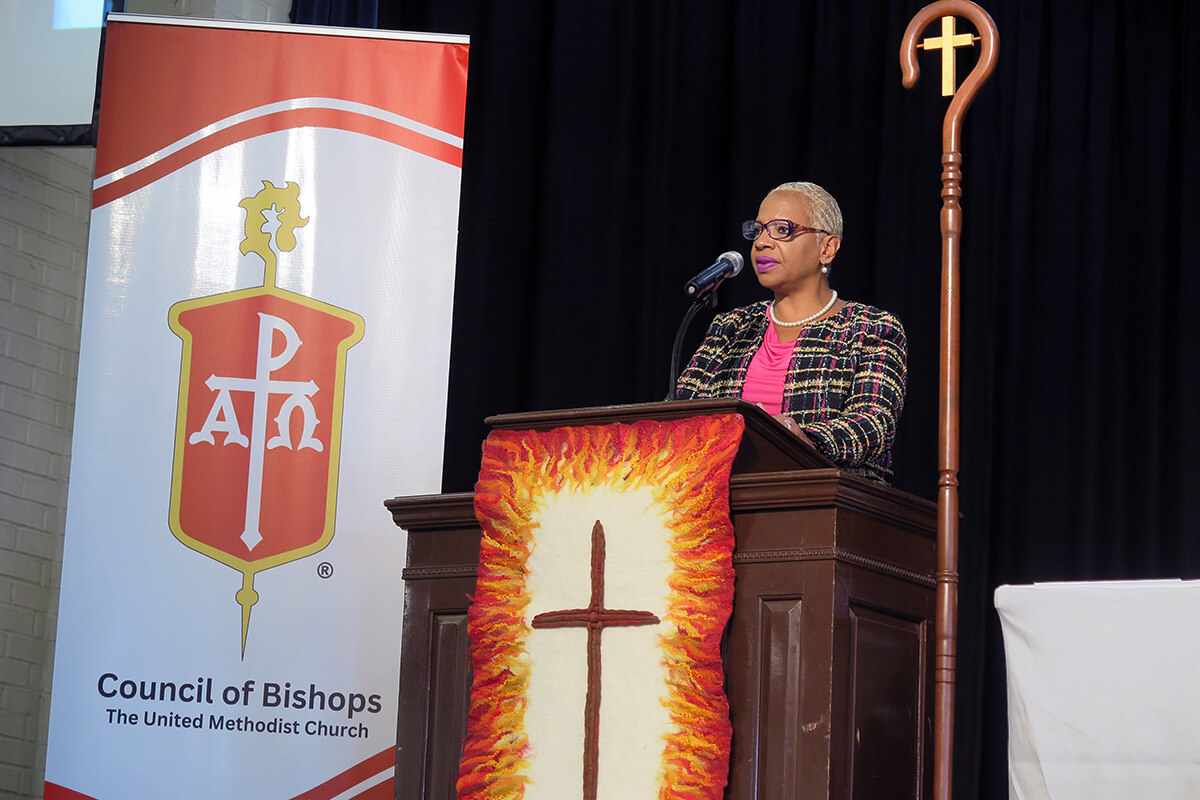Key points:
- Council of Bishops President Tracy S. Malone reminded her fellow bishops of God’s deliverance on the eve of the U.S. presidential election.
- In her first address as council president, Malone also spoke of how God is at work as The United Methodist Church begins a new chapter.
- She addressed an audience hoping to guide the denomination in dealing with big changes enacted by this year’s General Conference.
On the eve of a nail-bitingly tense U.S. presidential election, Council of Bishops President Tracy S. Malone reminded her fellow bishops that God’s deliverance is a theme that runs throughout Scripture.
She also spoke of how she sees God’s deliverance already at work as The United Methodist Church begins anew after years of internal rancor over the status of LGBTQ people.
“The United Methodist Church is moving forward choosing the pathway of love,” Malone said Nov. 4 in her first presidential address to the bishops. “And it is this love that we embody and multiply and witness in our communities and in the world.”
Some 100 active and retired bishops gathered this week at the United Methodist-related Epworth by the Sea Conference Center to discuss the denomination’s future and role in the world.
Malone, who also leads the Indiana Conference, is the first Black woman the bishops have elected as their president. She and her fellow episcopal leaders hope to guide The United Methodist Church as it seeks to let go of past acrimony and move into a more inclusive future that also maintains unity across multiple nations, cultures and theological perspectives.
In an address titled “Pressing Forward: All Things New Again!,” Malone preached on God’s promise of deliverance in Isaiah 43:16-21. In that familiar passage, God proclaims to the exiled and beleaguered Jewish people: “See, I am doing a new thing! Now it springs up; do you not perceive it? I am making a way in the wilderness and streams in the wasteland.”
Malone pointed to that passage as one of many in the Bible showing God’s will for people’s deliverance.
“It is God’s will for people to be liberated, to be free from bondage, despair and darkness — to live a free and an abundant life,” she said.
Malone said she often found herself praying to the Holy Spirit that God’s will for liberation be done — including in The United Methodist Church.
Subscribe to our
e-newsletter
Among her prayers, she said, is her cry to “heal and deliver us, The United Methodist Church, from the brokenness and trauma experienced from the many years of fighting and division and separation that led to disaffiliations and the splintering of the church.”
She reminded her audience that God has heard her and all people’s cries.
Malone — a lifelong United Methodist born in 1968, the same year as the merger that created The United Methodist Church — said she has never been “more hopeful about the future of The United Methodist Church as I am today!”
Earlier this year, General Conference — the denomination’s top lawmaking assembly — overwhelmingly voted to remove decades-old, denomination-wide stances against the practice of homosexuality, the ordination of gay clergy and officiation of same-sex weddings.
The same assembly also passed explicit protections so no United Methodist clergy would be compelled to officiate at any wedding against their conscience. General Conference also instituted the policy that the denomination’s central conferences — church regions in Africa, Europe and the Philippines — could set their own standards for ordination and marriage rites in line with local laws.
The General Conference also moved forward the plan for regionalization — which would transform the U.S. and each central conference into regional conferences with equal decision-making authority.
To take effect, the regionalization plan will need to be ratified by at least two-thirds of the total voters at the denomination’s 131 annual conferences — church bodies consisting of voters from multiple congregations and ministries.
Bishops preside but have no vote at General Conference. Nevertheless, they have committed to supporting the ratification of regionalization. The bishops plan for all annual conferences to hold votes on regionalization and other amendments to the denomination’s constitution by the end of next year.
Malone said United Methodists witnessed a profound display of God’s power, goodness and steadfast love at this year’s General Conference.
“The United Methodist Church no longer has any statements, policies or ‘othering’ practices within its polity that discriminates, regulates or excludes any person or people groups,” she said. “To God be the glory!”

In addition to removing language that marginalized LGBTQ people, she pointed out, General Conference also committed The United Methodist Church to being anti-racist and justice-seeking.
“God is doing a new thing,” Malone said. “The United Methodist Church is moving forward as a diverse worldwide church that celebrates theological differences, that celebrates diversity, and claims this rich diversity as God’s gift.”
She also emphasized that in The United Methodist Church, no one will be “required to act contrary to their convictions.”
Bishop Daniel O. Lunge, who leads multiple conferences in Central Congo, was among the bishops who was heartened by Malone’s message of unity amid the denomination’s diversity.
“She gave an excellent address,” said Lunge, who speaks French, through an interpreter. “As bishop, I was edified as our president gave us hope for the continuity of unity in our church.”
Malone stressed that The United Methodist Church can’t be boxed in to certain categories.
“The United Methodist Church is not a gay church. It’s not a straight church,” she said. “It’s not a Democratic church or a Republican church, or a progressive church or a traditional church. The United Methodist Church is the church of Jesus Christ.”
But even as she expressed hope for the new thing God is doing in her church home, Malone also expressed her concerns for her home country as the U.S. faces a monumental election.
For many U.S. voters, the presidential election is serving as referendum not only on various national policies but also the nation’s constitutional order. After the violent attempt to overturn the U.S. presidential results on Jan. 6, 2021, many Americans are also concerned about the threat of violence in the wake of the election.
In September, the Council of Bishops released a joint statement condemning political violence and authoritarianism. Since then, many United Methodist bishops in the U.S. have already released individual statements calling for prayer, compassion and peace as voters head to the polls and eventually the election results become known.
“Our witness can be no more prevalent than right now, especially on this eve of the presidential election and in the days that follow,” Malone said.
“We must be ever vigilant to stand against any form of violence in words or actions and be prepared to speak in prophetic ways and act in profound ways that make for peace.”
During morning worship Nov. 4, the Council of Bishops included a service of blessing for its two newest members — Bishops Kristin Stoneking and Sandra K. Olewine, who were elected this summer.
Both new bishops took inspiration from Malone’s address.
“Bishop Malone gave a clarifying and inspiring word about unity and about the responsibility and freedom,” Stoneking said. “It was especially meaningful for me, taking on this new role and knowing as a U.S. citizen, the choices we make this week. It was the right word for the right time for many contexts.”
Olewine shared a similar sentiment. She was especially touched when at the end of her address, Malone led the bishops in a prayer based on their consecration vows.
As they look at all the challenges that are facing the church, Olewine said Malone reminded the bishops that they need not be afraid.
“God, who is love, is constantly there leading the way,” Olewine said, “so that we can get out of our fear, out of our scarcity thinking, and just lean into this power that God has … Ultimately our job is to help form and come alongside and create and make disciples of Jesus Christ, so that the love of God gets more and more and more around the world.”
Malone also spoke of her continued hope for the denomination to grow in faith and in the positive impact it makes.
“God can and will do even greater works in us and through us, The United Methodist Church,” she said, “if we keep our hearts and minds and our leadership and ministry centered in Christ Jesus.”
Hahn is assistant news editor for UM News. Contact her at (615) 742-5470 or [email protected].To read more United Methodist news, subscribe to the free Daily or Friday Digests.




